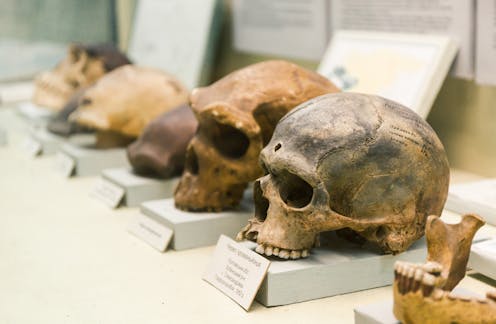4 reasons not teaching evolution in schools is immoral
- Written by Peter Ellerton, Senior Lecturer in Philosophy and Education; Curriculum Director, UQ Critical Thinking Project, The University of Queensland

Educators involved in curriculum design know one hard truth: you can’t fit in everything. Whatever the finished product, there will always be someone who thinks something important has been missed or something unnecessary has been included.
This is what happened in the recent redesign of the Australian Curriculum, for example, where the emphasis on Western civilisation became politicised[1].
When it comes to science curriculums, the amount of potential content that can be included is staggering.
In the case of physics in primary or middle schools, we may or may not see the inclusion of topics such as wave theory, acoustics, electronics or relativity. Some may lament these exclusions, but most agree physics at this level can be taught without them.
Similarly, there are areas of biology that may be considered optional at this level, such as botany, entomology or marine ecosystems. Evolution, however, is a concept that underpins and integrates all facets of biological study.
Read more: What exactly is the scientific method and why do so many people get it wrong?[2]
The central role of evolution in biology
As evolutionary biologist Theodosius Zobzansky noted in the title of his seminal essay[3], Nothing in Biology Makes Sense Except in the Light of Evolution.
Without evolution, the living world is a kaleidoscope of disconnected form and colour. With evolution, it is breathtakingly coherent. In terms of its simplicity and explanatory power, the theory of evolution by natural selection is arguably one of our most successful scientific achievements.
Because of evolution’s centrality to biology, its omission in any substantive course seems a matter of serious neglect.
Today many countries in the world, predominantly Islamic ones, do not teach evolution, as it is said to contradict[4] religious teachings.
Recently, India[5] also removed evolution from the formal education of students up to Year 10. This decision was supposedly related to its right-wing government’s commitment to promoting Hindu-nationalist[6] perspectives.
These examples do not represent simple oversight. They are serious attempts to restrict people thinking about evolution and, ultimately, to delegitimise science for ideological gain.
Excluding evolution is a moral concern
Omitting evolution from educational curriculums isn’t just educationally fraught, it’s also a serious moral issue.
Morally speaking, at least four related points present themselves in favour of the inclusion of evolution in any biology curriculum.
1. Equality of opportunity
John Rawls[7], one of the most influential political philosophers of the 20th century, set equality of opportunity[8] as a key social justice principle.
Many scientists have been inspired towards their work by understanding the grand narrative of evolution, which provides a coherent and effective framework to understand biological systems and their relationships.
Depriving students of this educational experience means they could be disadvantaged in further study or work. Or, worse, they might be dissuaded from it.
2. Free inquiry
Deliberate attempts to exclude serious rational inquiry are anathema to most philosophical schools of thought. Philosopher and scientist C.S. Peirce[9] expressed this powerfully:
Upon this first, and in one sense this sole, rule of reason, that in order to learn you must desire to learn, and in so desiring not be satisfied with what you already incline to think, there follows one corollary which itself deserves to be inscribed upon every wall of the city of philosophy: do not block the way of inquiry.
To stifle inquiry is also to inhibit the development of important traits in students – especially curiosity, one of our most powerful tools for knowledge creation.
3. Fairness and public reasoning
Philosopher Immanuel Kant, expressing the essence of the Enlightenment[10] as he saw it, set public reasoning through an individual commitment to rational inquiry as its cornerstone.
If we value the freedom to inquire and freedom of religious belief, it follows that no particular ideology should have unquestioned authority over others.
It’s naive to think science is a value-free arena. Yet it represents the most effective means of rational inquiry into the world we currently possess.
We can certainly allow for (and indeed need) explanations that the methodologies of science can’t provide. But rational inquiry needs to be accommodated, rather than usurped, by religious or political ideologies.
As the late author and journalist Christopher Hitchens[11] elegantly stated:
We do not rely solely upon science and reason, because these are necessary rather than sufficient factors, but we distrust anything that contradicts science or outrages reason.
4. Intellectual honesty, integrity and a commitment to scientific truths
An extended biology course that doesn’t contain evolution represents a promise made and broken.
To present something as scientific means it should embrace the methodologies and dispositions of scientific inquiry, including open-mindedness, scepticism and fallibility.
Ideologically driven censorship is therefore intellectually dishonest and, in these cases, results in a misrepresentation of science.
The bottom line
A moral stance is not something simply held dogmatically. It is one that can be reasoned in a way that’s rationally accessible to others.
Education in a cosmopolitan world – in as much as it is social, collaborative and cooperative – should be characterised by morality and rationality. Excising our best ideas from curriculums is both immoral and irrational.
Read more: Guide to the classics: Darwin's On the Origin of Species[12]
References
- ^ became politicised (theconversation.com)
- ^ What exactly is the scientific method and why do so many people get it wrong? (theconversation.com)
- ^ seminal essay (www.pbs.org)
- ^ said to contradict (www.nature.com)
- ^ India (www.science.org)
- ^ promoting Hindu-nationalist (www.aljazeera.com)
- ^ John Rawls (plato.stanford.edu)
- ^ equality of opportunity (edeq.stanford.edu)
- ^ C.S. Peirce (digitalcommons.montclair.edu)
- ^ Enlightenment (www.nypl.org)
- ^ Christopher Hitchens (www.nytimes.com)
- ^ Guide to the classics: Darwin's On the Origin of Species (theconversation.com)
Read more https://theconversation.com/4-reasons-not-teaching-evolution-in-schools-is-immoral-208653

















